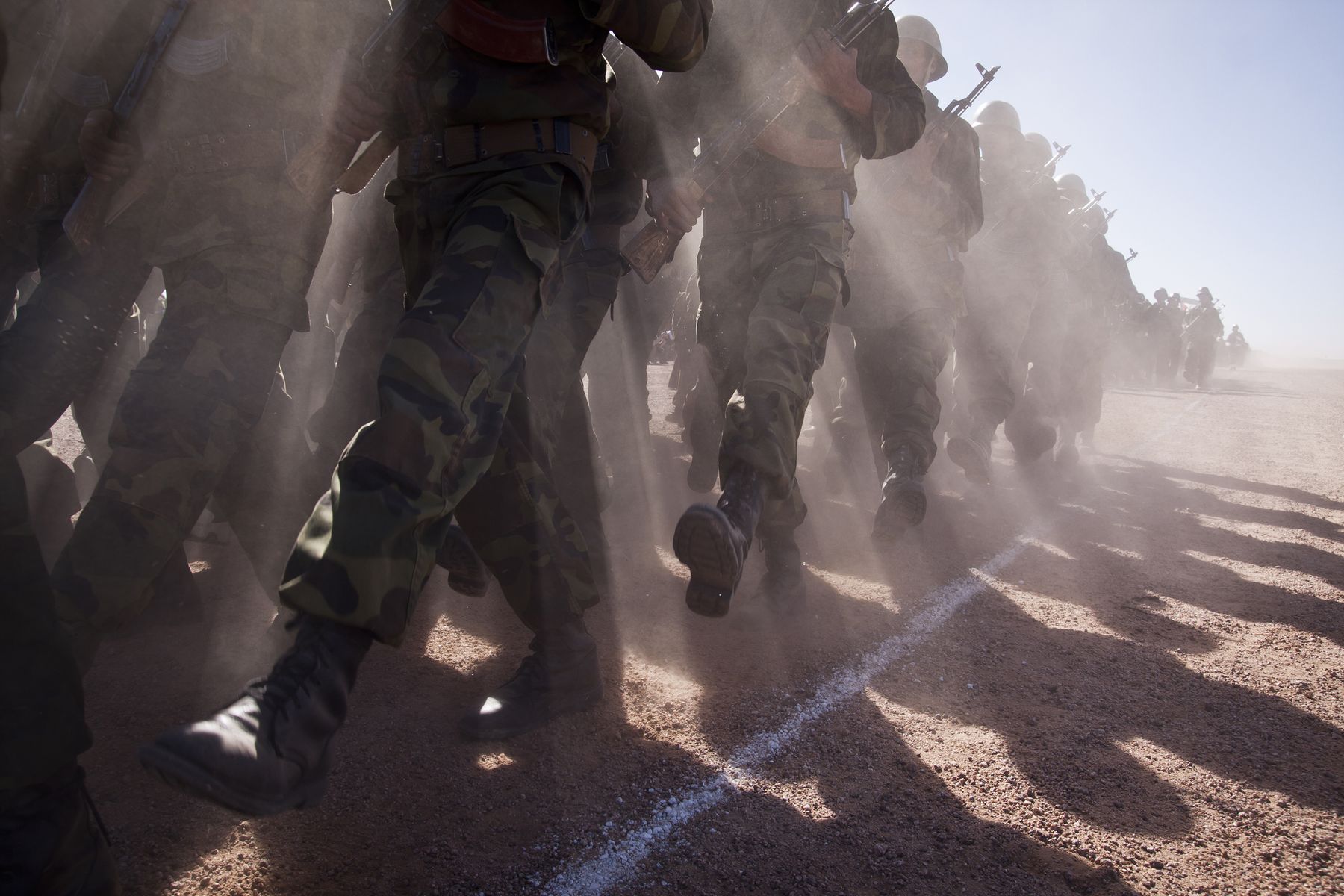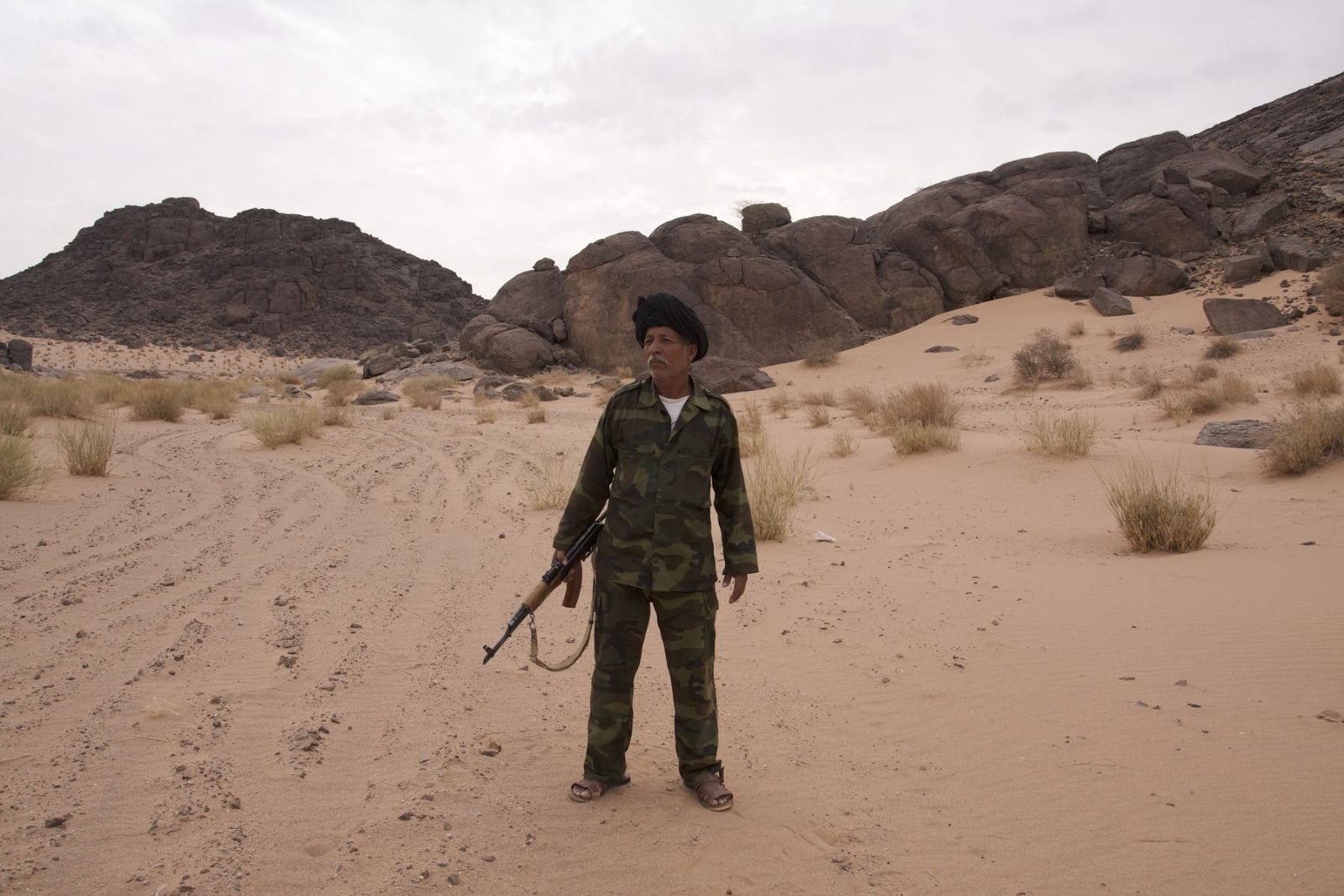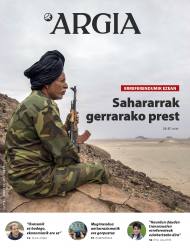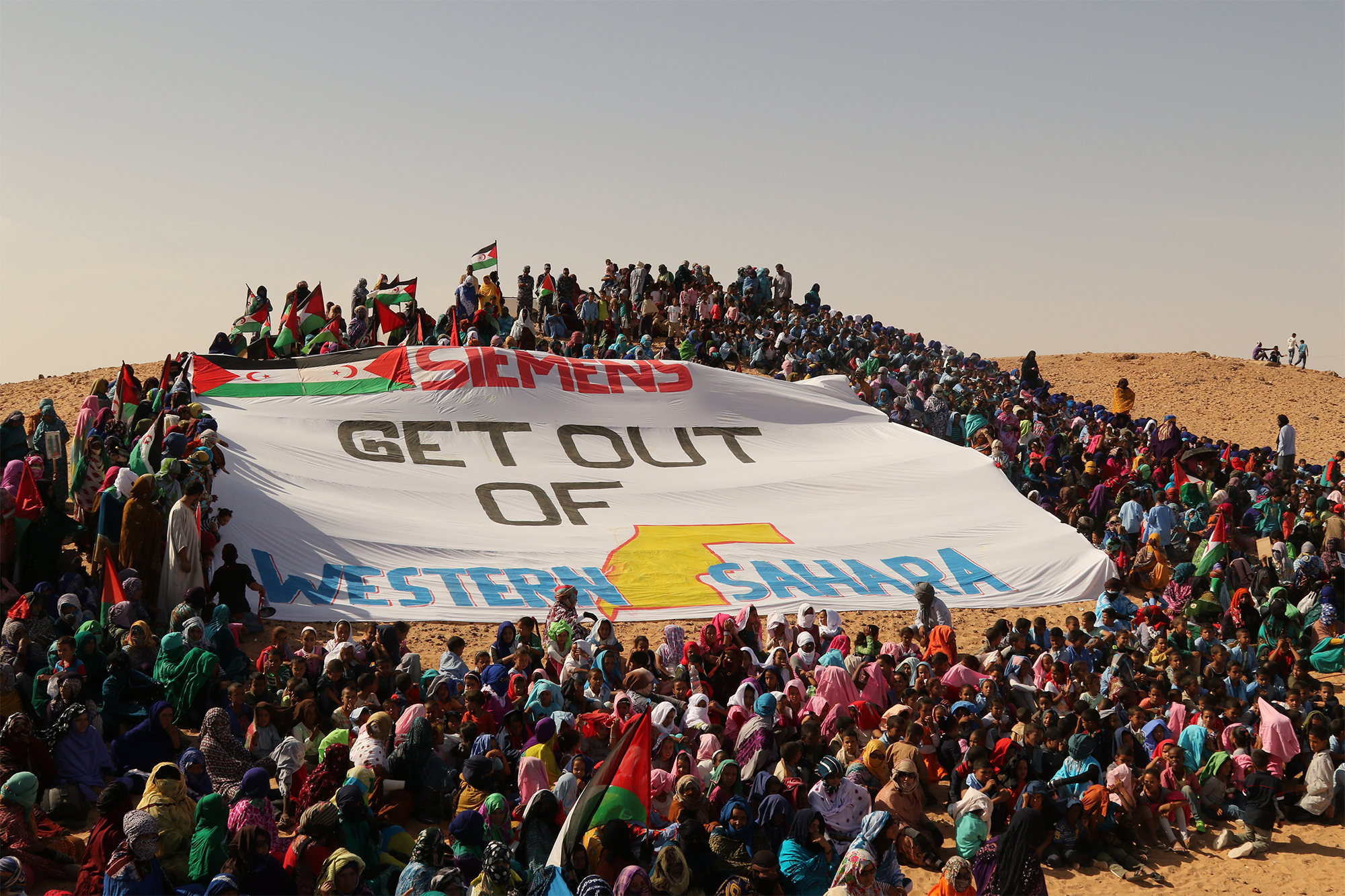Consequence of disillusionment and betrayal
- Few expected that the icy war would get warmer again after so many years. However, after many announcements, the Polisario Front and the Sahrawi people of Tinduf have reinstated the stacks charged with joy. Moreover, they have understood that the situation will not improve on their own.

The Sahrawi people do not have the legend of the wolf and the horned shepherd. The eternal story of the pastor who so often warned of the arrival of the wolf and that no one believed him when he really came. For 20 years, Mohamed Chejé has had to translate the same question to hassani from English in many conversations. "You threaten to return to war forever, but you have been doing almost 30 years without any military action in the country. Isn't it a threat like the legend of a wolf and a pastor? Journalists, diplomats, internationalists were asking... Over the years, only the Minister of Defence changed. -The same question to the stage managers. In the end I had to learn the legend to tell the minister," Chejé told me on 22 February 2016 in the building of the Saharawi Family Association of Prisoners and Missing Persons, AFAPREDESA, in Rabouni.
The reactivation of the conflict has made me open many photos and notebooks that I have kept for the last ten years. Old statements, stories and news. "But the Sahrawi are not like that pastor; we will fulfill."
Ahmed Salem Lebsir, a senior
military politician, studied in Cuba and participated in the conflict between 1986 and 1991. Morocco was moving across the defensive wall built with the help of Israel and, using guerrilla strategies, was taking action against the Moroccans. He participated in the famous Battle of Amgala and is a member of a historic family. His uncle Basiri Lebsir was "eliminated" in 1970 by the Spanish state. The father was beaten by the Moroccans in 1984 and disappeared after being apprehended by the Moroccan soldiers in Abderrama.
"The killings and crimes did not begin the king of Morocco, Hassan II.arekin; the Spaniards began a bloody oppression against my people, although now they want us to believe that it was a good colonisation. There is no good colonization! Spain always lies. With the Sahrawi people and with everyone. They have only betrayed our country," Ahmed Salem told me a week before the outbreak of this last war. "We're in a state of red alarm over the protests in Guerguerguerat. Ten years ago we didn't have it. I can't tell you more, but if you want to start writing the chronicle that we've come back to war. This time we have to meet the threat. (I didn't pay much attention and I've also been turned around the news.)

Reasons for starting, stopping and resuming war: The betrayal of Spain requires that the
Sahara war explain where the conflict comes from. The most powerful media in the Spanish State did not wish to report on Sahara unless news against the Polisario Front has been echoed. The Western Sahara has been reported in press releases from Rabat or Madrid. It's not "forgotten war," but "silenced."
The Sahara conflict began before the 1975 Green March. Before the founding of the Polisario Front, the Saharawi colonized expressed their desire to stop being oppressed and to be masters of their future. In 1970, for example, in the plain of Zemla (near the capital of Laayoune), thousands of people demonstrated with very clear demands: they wanted to start a process of decolonization, as in many other territories in Africa; they also wanted to achieve better working conditions and comparable rights for the colonizers. The response of the Franco Army in Spain was violent and shot to death at least six people, a number that, according to the sources, are different. Dozens of them also disappeared, one of them the aforementioned uncle of Ahmed Salem Lebsi, Basiri Lebsir, an ideologist and leader of the independence movement. Behind this disappearance are names that are still known to us today, such as that of Carlos Díaz Arkotxa, head of the Ertzaintza killed by ETA in 1985, or that of Díez. At the time he was the captain of the Spanish Army and many Sahrawis have pointed out to him as one of the culprits of the murders in Zemla.
-I still remember his voice. It was very penetrating. It caused panic among all of us who were prisoners. He was probably one of the last people to have seen Basi alive, but we don't know who made Basi disappear. Some witnesses told us that he was buried in a place outside the city and that those who shot him were military." I was told this by Cousin Sidi Lebsir in December 2018 when I was at the house of journalist Hassana Abdelazziz in Auserde.
These killings led to more and more citizens claiming independence and justice. Ahmed Mohamed Ahmed "opened his eyes to the Saharawi people and then we saw that only the Spaniards were looking at good in Madrid. They didn't care about our demands and our well-being, even though on the street and on the radio we were told the opposite. I entered the Polisario in June 1973 to face the Spanish army," explained Bir Lehlu, the veteran soldier in the capital of the liberated territories in 2012. The Polisario Front, which was already an armed group, had carried out its first action fifteen days before, on 20 May 1973. A Spanish base in Janga was attacked when they went to rescue the first Sahrawi president, Luali Mustafa Sayed. The operation went out to a thousand wonders and with one shot they took over the military base and released the prisoners. Among them was Brahim Galli, the current president of the Sahrawi people.

"I have always been surprised by the obsession of the Spanish Government with the Sahrawi people. At the time of Sergeant I had to go and pick up the burnt corpses of our soldiers near Tifarit. We were fraught with fear, but it was our mission and we had to," says J.S. Retired military personnel from Zaragoza [Aragon, Spanish State]. "We knew that it was the Moroccans who attacked the Spanish soldiers. They were military and crossed the border to attack our positions. We had a command not to shoot. We were very surprised by this strategy. And how they killed us! But we couldn't defend it. Then we learned that whoever was king of Spain, Juan Carlos I.ak, gave that order without saying anything to Franco. At that time he had strength and Hassan II.aren was favorable. All of these attacks were attributed, like many of those who came later, to the Polisario Front. The soldiers knew that the Sahrawis did not have the power to expel the helicopters and that the Land Rover could not remove them in that way. If they only had four carabins! ", remembers the former military.
The Spanish Government has acted in this way, always in favour of Morocco, before many other actions that came later. It must be taken into account in order to understand what Abdullah Arabi, ambassador of the Frente Polisario in Madrid, said when the conflict resurfaced: "We do not ask the Spanish Government for anything, only that it does not cause more pain than the one that caused it," he added.
The Kingdom of Spain has historically had systematic treason and now the Trump administration in the United States as a policy. It accepts sovereignty over the Sahara to Morocco if it initiates diplomatic relations with Israel – the father of King Mohamed VI Hassan II has had good relations with Tel Aviv and with Zionism since the 1980s. A statement that has completely abandoned all international laws. The United Nations position on this decision has been lukewarm and, as you would expect, so has the Kingdom of Spain, which remains a legally colonizing force. If that were not enough, the UN Secretary-General, António Guterres, and the Foreign Minister, Arantxa González Laya, did not mention the word "referendum", but referred to "the peace process".

War on UN defaults
The Sahara conflict began on 5 November 1975 when Morocco invaded the colony, involving more than 350,000 civilians and 40,000 Spanish soldiers. After the tripartite agreements in Madrid, Mauritania and Morocco decided to distribute the Sahara without any referendum to the Sahrawi people.Hassan II.aren invaded Iparralde under the command of the Green March. Civilians entered Smara and Tifarita, a town near the Sea of Tah, while the Moroccan military entered the tanks. They wanted to sell the international community as a peaceful and civil invasion, although it was totally military.
From the south, Mauritania also invaded the African colony militarily. On 27 February 1976, independence was proclaimed in the village of Bir Lehlu, with the aim of ensuring that the African Union and the international community take into account the Polisario and the Sahrawi people, almost a whole nation took refuge in the refugee camps in Tindouf, Algeria, where Morocco launched matches and napalm against civilians. The then president of the Polisario was Luali Mustafa Sayed. He died very young in the war against Mauritania in 1977. Since then it has become the symbol of the Sahrawi people who claim their independence and their image is seen everywhere who visits the camps.
During the war against Mauritania, the Sahrawis signed a peace agreement in 1979. Since then and until today, the Sahrawi and the Mauritanians have a good relationship, they can move from one to the other without permission. Following Mauritania ' s withdrawal from Western Sahara, Morocco illegally invaded the abandoned area. That same year, with the help of Israel, they began to build the armed wall that divides the entire nation from north to south. It currently has 2,500 kilometres of wall and it is estimated that there are about seven million mines to prevent the incursions of
Polisario.En 1991, Morocco and the Polisario signed a ceasefire. Its aim was to have a popular consultation on the Bateragune case in a few months' time. Almost 30 years have passed and this has never been the case, because Morocco always challenges who should participate in this consultation. On more than one occasion, the UN has surprised Rabat by miunderstand and inventing data. Violations of Moroccan human rights are also reported almost every day, but since France is a friend and has the right of veto in the UN, an appeal has never been made.
There have been many protests against all this. The most famous have been the 2010 Gdeim Izik camp and the Guergerat blockade, among others. It is the last place in Morocco on the journey from the Sahara to Mauritania. If the law were heeded, it should not be there. On a daily basis, however, a multitude of lorries break the cease-fire agreement. Through the blockade, the Sahrawis wanted to denounce the UN's forbearance, but it launched against the Moroccan civil armies and moved to the area controlled by the Polisario with their weapons. The Polisario ended the truce and the Sahrawi people, through the President, Brahim Galli, have promised that they will not shut down the arms until the referendum is held.
Hassana Abdelazziz is a photographer from the Sahrawi Press Service. President Brahim Galli said they would return to war when he said that in the refugee camps "a kind of party had been started." On November 28 I called him on the phone and "I am seeing in the village a joy that I have never met," he said. "We've made a journey from sadness to euphoria in a few minutes. Nor did we expect our government to take this decision. Not at least now that we are suffering from the pandemic and the closure of the borders of Algeria. But I think they've been brave. Morocco and the UN always thought they could do whatever they wanted with us. In addition, they have ensured that there will be no truce, or to speak of peace and referendum. The president said that only the day of the referendum will paralyse the conflict between Catalonia and the Basque Country. Therefore, the strategy we are going to follow is the homeland or death. We got tired of being here [in the Tindouf refugee camps]. The future will be war, even if it's death."

The military strategy of the Polisario has aroused many doubts. English General Montgomery claimed that losses in the desert, at sea or on the battlefields of the mountain can be doubled in the North African war against Rommel Nazism. It's the third largest army in Africa, after Egypt and Arjelia. It has made the largest investment in the purchase of arms ever made in the last four years. They also have satellites (Mohamed VI-A and Mohamed VI-B) for their custody. They've bought drones from the Trump Executive and trained soldiers so they can do remote actions. The polysario, on the other hand, is composed of Grad, Katiusha and Stinger, donated by Colonel Gaddafi of Libya in the 1980s and obsolete Russian tanks T-63. Today, however, Morocco has not carried out any attacks and has not entered the area under the control of the Polisario. It's become completely passive. Few images and lots of fake news have appeared on the net and it's hard to get transparent information.
Some experts say that non-participation in Morocco can be a strategy, that they want to make us believe that it is they who attack and that the commitment to peace is only their own. Following Trump’s statements, Morocco is waiting for the Polisario Front to enter the famous list of international terrorists and for that they are putting pressure on their lobbies. They once did the same with the internationalist movement towards Hamas and Palestine. USA, Mohamed VI.ak has announced that the nation wants to sell to the new government that is under the threat of terrorists. "The Polisario would force many of the associations and embassies it has in other territories and countries to close. The Sahrawi people live thanks to the help of several Governments, which have no source of income for the status of refugees. The aid it receives can be suspended and diplomats can be reduced to the freedom they have to move internationally. It can be said that they would lose the internationalist cause. And not only that, but, as a terrorist group, Morocco can justify the use of many strategies and weapons, including technically illegal ones, such as selective drone killings. The United States continues to use this technique even though there is no fixed case law. "The process of reducing the Palestine Liberation Organization in the 1980s could also occur with the Polisario," said Algerian journalist Riad Bouzzani in a phone interview.

John Bolton is a passionate advocate of the Sahrawi self-determination referendum. He worked for the Trump administration, until the president posted it through his official Twitter account. In an article published in the Foreign Policy on December 15, Trump said he "made a serious mistake" with his administration. "Republican Senator James Inhof wants to overturn this decision and will get it to Joe Biden," he says in the Lower House article. It has become clear that the Trump team wants to curb this in view of the statements being made in recent days on Twitter. Behind are the Zionist lobbys, like the attack group American Sionist Friendship. "The international community must understand, however, that the Polisario has every reason to take up arms again. If Morocco does not want a referendum, it is not worth a ceasefire. In addition, Rabat has swallowed its propaganda lie," Bolton says in his article. The former Security Adviser has also been very clear about the attitude of the Spanish State: "If you are in favour of saying nothing, keep it silent and stand aside." Bolton has always been very critical of Spain's neglect on the subject of Western Sahara and has criticised the situation. In many public hearings, he criticized Madrid that "it is about to comply with the law and that it is up to him to make a referendum in accordance with international law". In his view, Portugal ' s process in Timor is an example.
In the desert, the war has become red alive and the offices have been revived, causing many to open their eyes. The UN mission in the Sahara has become apparent as a waste money machine that is of no use – MINURSO is the longest mission in history and the least profitable it has ever achieved. The Spanish State has understood that the Sahrawi people will betray the Sahrawi people again and again, being the one who governs, and that they have acted illegally during these years by circumventing their duties. The tibidity of António Guterres in the fight against human rights violations has also been revealed to many. The French State (Self-Appointed Human Rights Defender) will continue to exercise its right of veto against Saharawi civil society in order to assist Morocco. United States is not in favour of compliance with the agreed law, nor is it in favour of them agreeing on their own.
Only the Sahrawi people have maintained permanent strength and clear hope. Many have wanted to leave out of the referendum equation to the Polisario, believing that a refugee and oppressed people does not have the future in their hands. With all dignity and with reason – moral and legal – in their favour, the oppressed have always had to return to the motto Si vis pacem parabellum: if you want peace, prepare for war. And that's where they are.
The girl who appears in the center of photography, which can hardly be considered historical, is writing a list of adjectives: I, you, he, we, you, they. Looking down, I couldn't see what his gaze looked like.
Insensitive to the work of the photographer, you, slowly and... [+]
Leaving behind books, libraries and their benefits in April, Kabiak Sahrawi wishes to recall the dark side of his history, which is of greater importance in defending the identity and survival of peoples. We are talking about the destruction of the age-old and usual libraries... [+]
Sahara, herri bat erresistentzian liburua argitaratu du Kristina Berasainek. Urte luzez jarraitu du Mendebaldeko Saharako gatazka, 2005ean BERRIA egunkariko kazetari gisa lurralde okupatuetara lehen aldiz bidaia egin zuenetik.
The Spanish Foreign Minister denies that Spain is the administering power of the Western Sahara. But yes.
For years, Spain said that it was neutral on the Sahara issue, albeit a lie: it was very partial. For Morocco. The Palestinian National Power has a diplomatic mission in... [+]
Marokok 2020an ia hiru hamarkadatako su etena hautsi zuenetik, gerra berrabiarazi dute Rabatek eta Mendebaldeko Saharako askapen mugimendu nazionalak. Polisarioa XVI. Kongresua egiten ari da egunotan, eta estrategia berria eztabaidatzen ari dira. Buruzagitzan Brahim Galik... [+]












, Nafarroako parlamentuan..jpeg)










